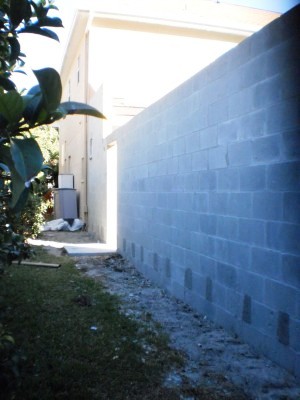|
Article Courtesy of The St. Petersburg Times By Marlene Sokol Published January 2, 2011 TAMPA — As a PTA president, Andrea Piacitelli knows how to follow rules. So before she started a backyard addition to her house, she got approval from her homeowner association. It is, after all, Westchase, where order and conformity reign supreme. But despite an approval from the modification committee, Piacitelli has found herself in conflict with onetime friend and next-door neighbor Jean Keelan.
Keelan, an educational consultant who worked previously at the private Carrollwood Day School, was an officer in the Westchase Community Association. She resigned recently over the wall issue. More than a month ago, she said, Piacitelli showed her drawings of the addition, fashioned after a California-style courtyard. "But she never told me about the wall," she said. She suspects Piacitelli gave her partial information so she could claim later that she had kept Keelan informed. Piacitelli did not return calls seeking comment. A poster child Developed in the 1990s on the western fringe of Hillsborough County, Westchase has long been a poster child for deed restriction extremism. Homeowners have been upbraided over picket fences and toddler swings, basketball nets and nonconforming lanai screens. Lawmakers, seeking to curtail arbitrary enforcement statewide, in 2007 changed the law that governs homeowners associations. The associations can rule on structural improvements, they wrote, "only to the extent that the authority is specifically stated" in deed restrictions. This summer, the Westchase Community Association amended its deed restrictions, to say that if a proposed improvement or modification is not specifically permitted in the documents, then it is prohibited. Piacitelli's notice of commencement, filed in the Hillsborough County courthouse, describes "a pool bath and a two-story structure with Florida room on first floor and bedroom extension/new bath on second floor," as well as a new pool cage. Although backyard pools in Westchase are generally encased in mesh screens, homeowner association president Joaquin Arrillaga said the Piacitelli addition is different because it essentially increases the size of the house. The couple's contractor worked out the details with an association architect, he added. "They did their due diligence." While insisting deed restriction enforcement is necessary to protect property values, he said amendments passed by the association in recent years generally reflect a desire to be more flexible, not less. "This board and its voting members have been extremely open to change," he said. Close-knit cul-de-sac Tony Esmkhani, who lives on the other side of the Piacitelli home, is one of Westchase's original homeowners. Their street is a close-knit cul-de-sac, he said. "We even know each other's cats." He's had neighbors who were ordered to replace the mulch in their yards, and is the first to admit that deed restrictions can be taken to extreme. He's ambivalent about the new courtyard. Like Keelan, he sees it most clearly from the side of his house, and it blocks the sun from some of his windows. He thinks the association's approval sets a precedent that could encourage similar additions. He might even want to build one of his own, he said. But he worries that overall, such structures will diminish the airy view families now have of the woods behind their homes. "Does it bother me? Yes," he said. "Will I lose sleep over it? No. Will I go to court and sue? No. I still have to live in the neighborhood." |
